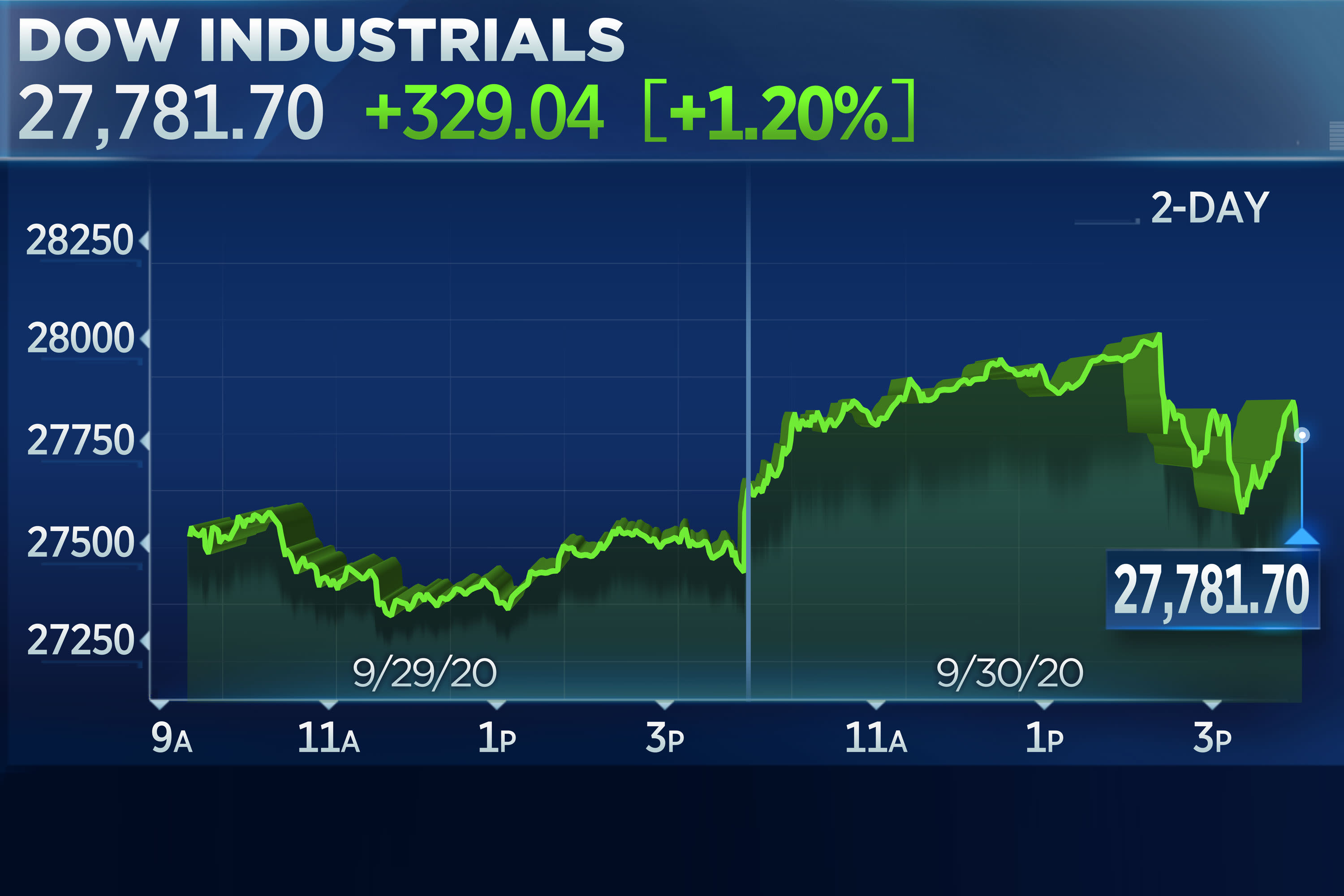Stocks cut gains in the final hour after Mnuchin-Pelosi meeting doesn’t result in deal yet

U.S. stocks pared strong losses in volatile trading on Wednesday after stimulus talks in Washington once again yielded no deal.
The Dow Jones Industrial Average last traded up 200 points, or 0.7%, after jumping 550 points at its session high. The S&P 500 gained 0.4%, while the tech-heavy Nasdaq Composite climbed 0.3%.
Stocks cut gains after House Speaker Nancy Pelosi and Treasury Secretary Steven Mnuchin failed to strike a coronavirus aid deal during a more than 90-minute meeting Wednesday. The pair will continue discussions as they try to craft an elusive fifth relief package that could pass both chambers of Congress. The market soared earlier in the session after Mnuchin said lawmakers were giving the bill “a serious try.”
Sentiment was helped by better-than-expected economic data. ADP’s monthly private-sector jobs count showed growth of 749,000 in September, ahead of the 600,000 expected from a Dow Jones economist survey. Meanwhile, pending home sales soared 8.8% in August, marking its highest pace on record, according to the National Association of Realtors survey.
Stocks sensitive to the economic recovery, including banks and cruise operators, were among the biggest winners on Wednesday. JPMorgan, Goldman Sachs and Citigroup all gained at least 1%. Norwegian Cruise popped more than 3%.
Major averages are headed for their first monthly declines since March. The S&P 500 is down more than 3% this month, on pace for its first down month in six. The Dow and the Nasdaq Composite have fallen 2.3% and 4.7%, respectively, in September.
Vicious first debate
Investors digested the first debate between President Donald Trump and Democratic nominee Joe Biden Tuesday evening, which turned out to be particularly vicious with constant interruptions and insults. Wall Street remained concerned that it will be a drawn-out electoral process that could hit the market.
“It was a long night and there’s a lot that needs to be sorted out,” said Daniel Deming, managing director at KKM Financial. “It became pretty apparent that this thing is not going to be over on Nov. 3 and I think the market is probably not too crazy about that.”
“The short-term volatility pressures probably won’t abate anytime soon after this debate. In a sense, it’s creating even more uncertainty,” Deming said.
Trump and Biden sparred on a number of issues, including their qualifications to manage the U.S. economy, the nomination of Amy Coney Barrett to the Supreme Court, as well as the U.S.’ handling of the coronavirus pandemic.
Many market strategists have cited uncertainty around the election as a key headwind for the market before year-end with each outcome bringing its own risks and benefits. Some investors have raised concerns about a potential Biden win as they fear it could lead to higher corporate taxes and tighter regulations. But at the same time, it could ease concerns about the trade war and lack of stimulus to bolster the economy in the wake of the coronavirus.
Investors are also worried about the potential that the Nov. 3 result is too close to call and neither candidate concedes. That uncertainty could particularly weigh on the market.
Trump frequently claims that mail-in balloting leads to voter fraud even though experts have repeatedly said there’s no proof of that ever having been a problem in the United States. Last week the director of the FBI told a Senate committee that there’s no evidence of widespread voter fraud in the United States “whether it’s by mail or otherwise.”
Regardless, on Tuesday night Trump said, “As far as the ballots are concerned, it’s a disaster. This is going to be a fraud like you’ve never seen.”
“Questions on election fraud were raised, which will add to concerns about a volatile post-election period if there is a close or uncertain electoral outcome,” wrote Ed Mills of Raymond James in a note entitled “Dumpster Fire Debate.”
Virus treatment hopes
Positive data regarding a potential coronavirus treatment from Regeneron Pharmaceuticals helped boost sentiment on Wall Street.
Regeneron said after the close Tuesday its REGN-COV2 drug reduced viral levels and improved symptoms in non-hospitalized coronavirus patients.
Meanwhile, Moderna’s experimental Covid-19 vaccine appears safe and shows signs of working in older adults, according to study results published in the New England Journal of Medicine. However, Financial Times reported Wednesday Moderna’s vaccine won’t be ready before the November election.
The major averages snapped a three-day winning streak on Tuesday, with the Dow falling more than 100 points, or 0.5%. Those losses came amid concerns over a virus resurgence. New York City Mayor Bill De Blasio said the city’s daily positive rate of coronavirus tests is back above 3% for the first time in months.
“Coronavirus infection rates are rising in Europe and the United States as children return to school,” Terry Sandven, chief equity strategist at U.S. Bank Wealth Management, wrote in a note. “We expect the United States to continue its modest pace of economic improvement, though virus growth and a softer labor market are threats.”
Disney shares lost more than 1% after the company said it would lay off 28,000 people in its theme parks division.
Subscribe to CNBC PRO for exclusive insights and analysis, and live business day programming from around the world.




